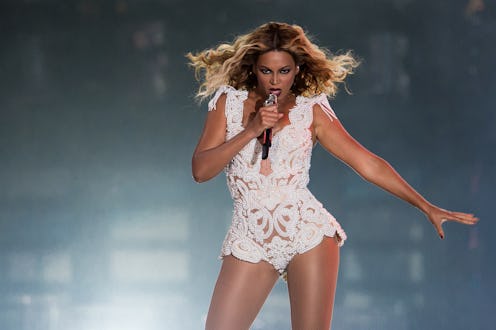News
A Better Way to Get Over Your Stage Fright
We all know Queen Bey's got it down, but for the rest of us, performance-related anxiety — be it stage fright or pre-meeting-with-the-boss jitters — can be the worst. However, a new study out from Harvard Business School says that the most effective way to deal with it isn't telling ourselves to calm down, but to amp ourselves up for the event.
“Anxiety is incredibly pervasive," said study author Alison Wood Brooks. "People have a very strong intuition that trying to calm down is the best way to cope with their anxiety, but that can be very difficult and ineffective. When people feel anxious and try to calm down, they are thinking about all the things that could go badly.
Basically, by telling themselves to calm down, people are acknowledging that what's about to happen is something they should be worried about. On the other hand...
"When they are excited, they are thinking about how things could go well,” Brooks said.
And it's easy enough to do, even if you have to fake your way into it. "A few simple statements" about excitement are enough to do the trick, the researchers found after surveying 140 subjects. They were asked to prep a persuasive public speech, and were told it would be shown to a panel of judges before being taped — just to make the situation a little more stress-y. Before they stared, they were asked to say either "I am excited" or "I am calm." According to ratings from third-party judges, those who were excited did better — looking at the length of their speech, persuasiveness, and stress levels — than those who said they were calm.
Subsequent trials involving math exams and karaoke yielded similar results:
In a trial involving karaoke, 113 participants (54 men and 59 women) were randomly assigned to say that they were anxious, excited, calm, angry or sad before singing a popular rock song on a video game console. A control group didn’t make any statement. All of the participants monitored their heart rates using a pulse meter strapped onto a finger to measure their anxiety.
Participants who said they were excited scored an average of 80 percent on the song based on their pitch, rhythm and volume as measured by the video game’s rating system. Those who said they were calm, angry or sad scored an average of 69 percent, compared to 53 percent for those who said they were anxious. Participants who said they were excited also reported feeling more excited and confident in their singing ability.
One of the reasons could be that both excitement and anxiety are both "high states of arousal" — your awareness is up, and your senses are stimulated.
“When you feel anxious, you’re ruminating too much and focusing on potential threats,” Brooks said. “In those circumstances, people should try to focus on the potential opportunities. It really does pay to be positive, and people should say they are excited. Even if they don’t believe it at first, saying ‘I’m excited’ out loud increases authentic feelings of excitement.”
Previous studies about positive thinking have been optimistic about its potential for handling stress and anxiety. A 2007 study found that positive emotions, such as excitement, can coincide with negative ones, such as anxiety, in stressful situations, and that they play an important, coping role in dealing with them. A recent 'broaden-and-build' theory, proposed in 2001 and supported among psychologists, suggests that the experience of positive emotions, such as excitement, broadens people's intellectual and social skill sets by allowing them more creativity in their 'momentary thought-action repertoires' — the ways in which they're likely to react to a situation. Following this theory, people who channeled excitement under anxiety-filled scenarios (like say, giving a persuasive public speech or getting up for karaoke) would respond better to the situation, compared to people who tried to simply dampen the body's instinctual reactions to stress by telling themselves to calm down.
So the next time you're prepping for a big presentation, maybe skip the zen guided imagery and instead imagine you're opening for Beyonce and pretty psyched about it. Because who wouldn't be?
